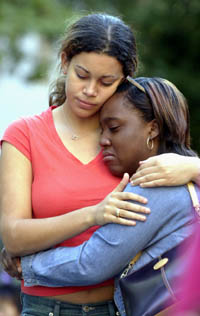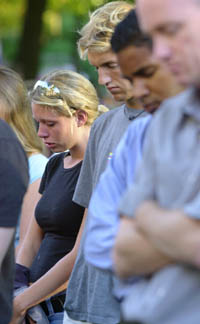Coming together: Harvard seeks solace through community
Harvard seeks solace through community

As the horrendous images of devastation at New York’s World Trade Center and destruction at the Pentagon blanketed the airwaves Tuesday, Harvard absorbed the awful news, shook off the shock, and got to work.
It was anything but business as usual, however. At Harvard, as at many universities and businesses across the country, normal functioning ground to a halt. Some classes were canceled and some offices closed, but others kicked into high gear.
The Harvard University Police Department immediately called in more officers to secure different areas at the University and reassure members of the community.
Counselors were ready at University Health Services and the Bureau of Study Counsel, which both established extended walk-in hours for those seeking help dealing with the tragedy. Harvard’s religious leaders reached out to the community in services at several schools, highlighted by a Tercentenary Theatre prayer vigil attended by about 5,000.
The response continued Tuesday night, when a team of 35 left Harvard-affiliated Massachusetts General Hospital for New York City, and into Wednesday, with University Health Services beginning to run buses three times a day to Brigham and Women’s Hospital and Children’s Hospital for those wanting to donate blood. All Harvard-affiliated hospitals were making preparations to treat the wounded from New York.
While others dealt with the shock and grief of Harvard’s internal community, staffers at information offices around the University dealt with calls from reporters around the world looking for experts who could make sense of the senseless.

Communications Director at the Kennedy School of Government Jesus Mena said one of the most important Kennedy School activities Tuesday was the convening of a “community meeting” in the ARCO Forum where several faculty members, led by Dean Joseph S. Nye Jr., answered questions from several hundred students who had gathered there throughout the day to watch coverage of the tragedy on the Forum’s large-screen television.
Nye urged people to maintain perspective on the day’s events and to avoid creating scapegoats, a theme echoed by others, including Jessica Stern, a lecturer in public policy and an expert on terrorism and national security.
“It is important to remember what we value most as a society – civil liberties and the idea that people are innocent until proven guilty,” Stern said.
Miles Shore, the Bullard Professor of Psychiatry at the Kennedy School, spoke of the shock and grief that most people are feeling now and predicted that in the days to come nearly everyone will find that they know someone in some way connected to the tragedy.
“None of us feels as safe today as we did yesterday,” he said.
Shore spoke of the blood drive and of preparations at the Medical School to treat the overflow of casualties from New York hospitals.
“The way to salvage something from this is to feel that we can be useful and to do positive things,” he said.




